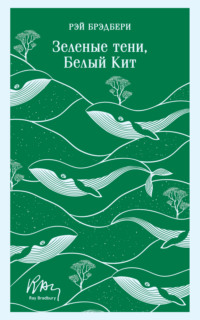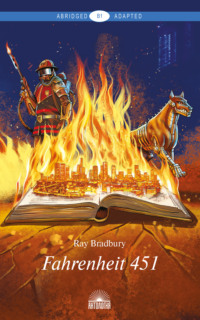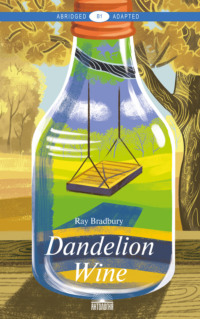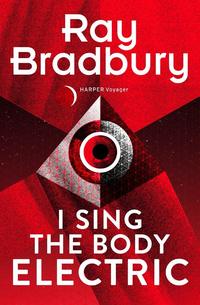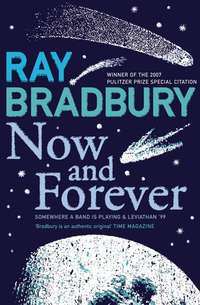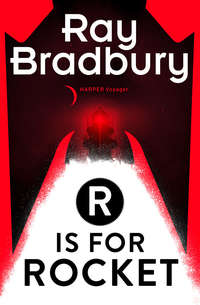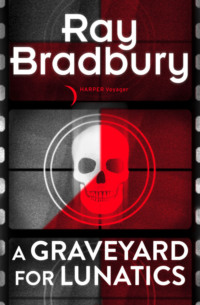
Полная версия
Ray Bradbury Stories Volume 2
‘Have we had this conversation before?’ he said.
‘A dozen times in the last year, but you never listened, you were hopeless.’
‘No, in love and helpless.’
‘You’ve got one minute to make up your mind. Sixty seconds.’ She was staring at her wristwatch.
‘Get up off the floor,’ he said, embarrassed.
‘If I do, it’s out the door and gone,’ she said. ‘Forty-nine seconds to go, Ollie.’
‘Stan,’ he groaned.
‘Thirty,’ she read her watch. ‘Twenty. I’ve got one knee off the floor. Ten. I’m beginning to get the other knee up. Five. One.’
And she was standing on her feet.
‘What brought this on?’ he asked.
‘Now,’ she said, ‘I am heading for the door. I don’t know. Maybe I’ve thought about it more than I dared even notice. We are very special wondrous people, Ollie, and I don’t think our like will ever come again in the world, at least not to us, or I’m lying to myself and I probably am. But I must go and you are free to come along, but can’t face it or don’t know it. And now—’ she reached out. ‘My hand is on the door and—’
‘And?’ he said, quietly.
‘I’m crying,’ she said.
He started to get up but she shook her head.
‘No, don’t. If you touch me I’ll cave in, and to hell with that. I’m going. But once a year will be forbearance day, or forgiveness day or whatever in hell you want to call it. Once a year I’ll show up at our flight of steps, no piano, same hour, same time as that night when we first went there and if you’re there to meet me I’ll kidnap you or you me, but don’t bring along and show me your damn bank balance or give me any of your lip.’
‘Stan,’ he said.
‘My God,’ she mourned.
‘What?’
‘This door is heavy. I can’t move it.’ She wept. ‘There. It’s moving. There.’ She wept more. ‘I’m gone.’
The door shut.
‘Stan!’ He ran to the door and grabbed the knob. It was wet. He raised his fingers to his mouth and tasted the salt, then opened the door.
The hall was already empty. The air where she had passed was just coming back together. Thunder threatened when the two halves met. There was a promise of rain.
He went back to the steps on October 4 every year for three years, but she wasn’t there. And then he forgot for two years but in the autumn of the sixth year, he remembered and went back in the late sunlight and walked up the stairs because he saw something halfway up and it was a bottle of good champagne with a ribbon and a note on it, delivered by someone, and the note read:
‘Ollie, dear Ollie. Date remembered. But in Paris. Mouth’s not the same, but happily married. Love. Stan.’
And after that, every October he simply did not go to visit the stairs. The sound of that piano rushing down that hillside, he knew, would catch him and take him along to where he did not know.
And that was the end, or almost the end, of the Laurel and Hardy love affair.
There was, by amiable accident, a final meeting.
Traveling through France fifteen years later, he was walking on the Champs Elysées at twilight one afternoon with his wife and two daughters, when he saw this handsome woman coming the other way, escorted by a very sober-looking older man and a very handsome dark-haired boy of twelve, obviously her son.
As they passed, the same smile lit both their faces in the same instant.
He twiddled his necktie at her.
She tousled her hair at him.
They did not stop. They kept going. But he heard her call back along the Champs Elysées, the last words he would ever hear her say:
‘Another fine mess you’ve got us in!’ And then she added the old, the familiar name by which he had gone in the years of their love.
And she was gone and his daughters and wife looked at him and one daughter said, ‘Did that lady call you Ollie?’
‘What lady?’ he said.
‘Dad,’ said the other daughter, leaning in to peer at his face. ‘You’re crying.’
‘No.’
‘Yes, you are. Isn’t he, Mom?’
‘Your papa,’ said his wife, ‘as you well know, cries at telephone books.’
‘No,’ he said, ‘just one hundred and fifty steps and a piano. Remind me to show you girls, someday.’
They walked on and he turned and looked back a final time. The woman with her husband and son turned at that very moment. Maybe he saw her mouth pantomime the words, So long, Ollie. Maybe he didn’t. He felt his own mouth move, in silence: So long, Stan.
And they walked in opposite directions along the Champs Elysées in the late light of an October sun.
Unterderseaboat Doktor
The incredible event occurred during my third visit to Gustav Von Seyfertitz, my foreign psychoanalyst.
I should have guessed at the strange explosion before it came.
After all, my alienist, truly alien, had the coincidental name, Von Seyfertitz, of the tall, lean, aquiline, menacing, and therefore beautiful actor who played the high priest in the 1935 film She.
In She, the wondrous villain waved his skeleton fingers, hurled insults, summoned sulfured flames, destroyed slaves, and knocked the world into earthquakes.
After that, ‘At Liberty,’ he could be seen riding the Hollywood Boulevard trolley cars as calm as a mummy, as quiet as an unwired telephone pole.
Where was I? Ah, yes!
It was my third visit to my psychiatrist. He had called that day and cried, ‘Douglas, you stupid goddamn son of a bitch, it’s time for beddy-bye!’
Beddy-bye was, of course, his couch of pain and humiliation where I lay writhing in agonies of assumed Jewish guilt and Northern Baptist stress as he from time to time muttered, ‘A fruitcake remark!’ or ‘Dumb!’ or ‘If you ever do that again, I’ll kill you!’
As you can see, Gustav Von Seyfertitz was a most unusual mine specialist. Mine? Yes. Our problems are land mines in our heads. Step on them! Shock-troop therapy, he once called it, searching for words. ‘Blitzkrieg?’ I offered.
‘Ja!’ He grinned his shark grin. ‘That’s it!’
Again, this was my third visit to his strange, metallic-looking room with a most odd series of locks on a roundish door. Suddenly, as I was maundering and treading dark waters, I heard his spine stiffen behind me. He gasped a great death rattle, sucked air, and blew it out in a yell that curled and bleached my hair:
‘Dive! Dive!’
I dove.
Thinking that the room might be struck by a titanic iceberg, I fell, to scuttle beneath the lion-claw-footed couch.
‘Dive!’ cried the old man.
‘Dive?’ I whispered, and looked up.
To see a submarine periscope, all polished brass, slide up to vanish in the ceiling.
Gustav Von Seyfertitz stood pretending not to notice me, the sweat-oiled leather couch, or the vanished brass machine. Very calmly, in the fashion of Conrad Veidt in Casablanca, or Erich Von Stroheim, the manservant in Sunset Boulevard … he …
… lit a cigarette and let two calligraphic dragon plumes of smoke write themselves (his initials?) on the air.
‘You were saying?’ he said.
‘No.’ I stayed on the floor. ‘You were saying. Dive?’
‘I did not say that,’ he purred.
‘Beg pardon, you said, very clearly – Dive!’
‘Not possible.’ He exhaled two more scrolled dragon plumes. ‘You hallucinate. Why do you stare at the ceiling?’
‘Because,’ I said, ‘unless I am further hallucinating, buried in that valve lock up there is a nine-foot length of German Leica brass periscope!’
‘This boy is incredible, listen to him,’ muttered Von Seyfertitz to his alter ego, which was always a third person in the room when he analyzed. When he was not busy exhaling his disgust with me, he tossed asides at himself. ‘How many martinis did you have at lunch?’
‘Don’t hand me that, Von Seyfertitz. I know the difference between a sex symbol and a periscope. That ceiling, one minute ago, swallowed a long brass pipe, yes!?’
Von Seyfertitz glanced at his large, one-pound-size Christmas watch, saw that I still had thirty minutes to go, sighed, threw his cigarette down, squashed it with a polished boot, then clicked his heels.
Have you ever heard the whack when a real pro like Jack Nicklaus hits a ball? Bamm. A hand grenade!
That was the sound my Germanic friend’s boots made as he knocked them together in a salute.
Crrrack!
‘Gustav Mannerheim Auschlitz Von Seyfertitz, Baron Woldstein, at your service!’ He lowered his voice. ‘Unterderseaboat—’
I thought he might say ‘Doktor.’ But:
‘Unterderseaboat Captain!’
I scrambled off the floor.
Another crrrack and—
The periscope slid calmly down out of the ceiling, the most beautiful Freudian cigar I had ever seen.
‘No!’ I gasped.
‘Have I ever lied to you?’
‘Many times!’
‘But’ – he shrugged—‘little white ones.’
He stepped to the periscope, slapped two handles in place, slammed one eye shut, and crammed the other angrily against the viewpiece, turning the periscope in a slow roundabout of the room, the couch, and me.
‘Fire one,’ he ordered.
I almost heard the torpedo leave its tube.
‘Fire two!’ he said.
And a second soundless and invisible bomb motored on its way to infinity.
Struck midships, I sank to the couch.
‘You, you!’ I said mindlessly. ‘It!’ I pointed at the brass machine. ‘This!’ I touched the couch. ‘Why?’
‘Sit down,’ said Von Seyfertitz.
‘I am.’
‘Lie down.’
‘I’d rather not,’ I said uneasily.
Von Seyfertitz turned the periscope so its topmost eye, raked at an angle, glared at me. It had an uncanny resemblance, in its glassy coldness, to his own fierce hawk’s gaze.
His voice, from behind the periscope, echoed.
‘So you want to know, eh, how Gustav Von Seyfertitz, Baron Woldstein, suffered to leave the cold ocean depths, depart his dear North Sea ship, flee his destroyed and beaten fatherland, to become the Unterderseaboat Doktor—’
‘Now that you mention—’
‘I never mention! I declare. And my declarations are sea-battle commands.’
‘So I noticed …’
‘Shut up. Sit back—’
‘Not just now …’ I said uneasily.
His heels knocked as he let his right hand spider to his top coat pocket and slip forth yet a fourth eye with which to fasten me: a bright, thin monocle which he screwed into his stare as if decupping a boiled egg. I winced. For now the monocle was part of his glare and regarded me with cold fire.
‘Why the monocle?’ I said.
‘Idiot! It is to cover my good eye so that neither eye can see and my intuition is free to work!’
‘Oh,’ I said.
And he began his monologue. And as he talked I realized his need had been pent up, capped, for years, so he talked on and on, forgetting me.
And it was during this monologue that a strange thing occurred. I rose slowly to my feet as the Herr Doktor Von Seyfertitz circled, his long, slim cigar printing smoke cumuli on the air, which he read like white Rorschach blots.
With each implantation of his foot, a word came out, and then another, in a sort of plodding grammar. Sometimes he stopped and stood poised with one leg raised and one word stopped in his mouth, to be turned on his tongue and examined. Then the shoe went down, the noun slid forth and the verb and object in good time.
Until at last, circling, I found myself in a chair, stunned, for I saw:
Herr Doktor Von Seyfertitz stretched on his couch, his long spider fingers laced on his chest.
‘It has been no easy thing to come forth on land,’ he sibilated. ‘Some days I was the jellyfish, frozen. Others, the shore-strewn octopi, at least with tentacles, or the crayfish sucked back into my skull. But I have built my spine, year on year, and now I walk among the land men and survive.’
He paused to take a trembling breath, then continued:
‘I moved in stages from the depths to a houseboat, to a wharf bungalow, to a shore-tent and then back to a canal in a city and at last to New York, an island surrounded by water, eh? But where, where, in all this, I wondered, would a submarine commander find his place, his work, his mad love and activity?
‘It was one afternoon in a building with the world’s longest elevator that it struck me like a hand grenade in the ganglion. Going down, down, down, other people crushed around me, and the numbers descending and the floors whizzing by the glass windows, rushing by flicker-flash, flicker-flash, conscious, subconscious, id, ego-id, life, death, lust, kill, lust, dark, light, plummeting, falling, ninety, eighty, fifty, lower depths, high exhilaration, id, ego, id, until this shout blazed from my raw throat in a great all-accepting, panic-manic shriek:
‘“Dive! Dive!”’
‘I remember,’ I said.
‘“Dive!” I screamed so loudly that my fellow passengers, in shock, peed merrily. Among stunned faces, I stepped out of the lift to find one-sixteenth of an inch of pee on the floor. “Have a nice day!” I said, jubilant with self-discovery, then ran to self-employment, to hang a shingle and next my periscope, carried from the mutilated, divested, castrated unterderseaboat all these years. Too stupid to see in it my psychological future and my final downfall, my beautiful artifact, the brass genitalia of psychotic research, the Von Seyfertitz Mark Nine Periscope!’
‘That’s quite a story,’ I said.
‘Damn right,’ snorted the alienist, eyes shut. ‘And more than half of it true. Did you listen? What have you learned?’
‘That more submarine captains should become psychiatrists.’
‘So? I have often wondered: did Nemo really die when his submarine was destroyed? Or did he run off to become my great-grandfather and were his psychological bacteria passed along until I came into the world, thinking to command the ghostlike mechanisms that haunt the under-tides, to wind up with the fifty-minute vaudeville routine in this sad, psychotic city?’
I got up and touched the fabulous brass symbol that hung like a scientific stalactite in mid-ceiling.
‘May I look?’
‘I wouldn’t if I were you.’ He only half heard me, lying in the midst of his depression as in a dark cloud.
‘It’s only a periscope—’
‘But a good cigar is a smoke.’
I remembered Sigmund Freud’s quote about cigars, laughed, and touched the periscope again.
‘Don’t!’ he said.
‘Well, you don’t actually use this for anything, do you? It’s just a remembrance of your past, from your last sub, yes?’
‘You think that?’ He sighed. ‘Look!’
I hesitated, then pasted one eye to the viewer, shut the other, and cried:
‘Oh, Jesus!’
‘I warned you!’ said Von Seyfertitz.
For they were there.
Enough nightmares to paper a thousand cinema screens. Enough phantoms to haunt ten thousand castle walls. Enough panics to shake forty cities into ruin.
My God, I thought, he could sell the film rights to this worldwide!
The first psychological kaleidoscope in history.
And in the instant another thought came: how much of that stuff in there is me? Or Von Seyfertitz? Or both? Are these strange shapes my maundering daymares, sneezed out in the past weeks? When I talked, eyes shut, did my mouth spray invisible founts of small beasts which, caught in the periscope chambers, grew outsize? Like the microscopic photos of those germs that hide in eyebrows and pores, magnified a million times to become elephants on Scientific American covers? Are these images from other lost souls trapped on that couch and caught in the submarine device, or leftovers from my eyelashes and psyche?
‘It’s worth millions!’ I cried. ‘Do you know what this is!?’
‘Collected spiders, Gila monsters, trips to the Moon without gossamer wings, iguanas, toads out of bad sisters’ mouths, diamonds out of good fairies’ ears, crippled shadow dancers from Bali, cut-string puppets from Geppetto’s attic, little-boy statues that pee white wine, sexual trapeze performers’ allez-oop, obscene finger-pantomimes, evil clown faces, gargoyles that talk when it rains and whisper when the wind rises, basement bins full of poisoned honey, dragonflies that sew up every fourteen-year-old’s orifices to keep them neat until they rip the sutures, aged eighteen. Towers with mad witches, garrets with mummies for lumber—’
He ran out of steam.
‘You get the general drift.’
‘Nuts,’ I said. ‘You’re bored. I could get you a five-million-dollar deal with Amalgamated Fruitcakes Inc. and the Sigmund F. Dreamboats, split three ways!’
‘You don’t understand,’ said Von Seyfertitz. ‘I am keeping myself busy, busy, so I won’t remember all the people I torpedoed, sank, drowned mid-Atlantic in 1944. I am not in the Amalgamated Fruitcake Cinema business. I only wish to keep myself occupied by paring fingernails, cleaning earwax, and erasing inkblots from odd beanbags like you. If I stop, I will fly apart. That periscope contains all and everything I have seen and known in the past forty years of observing pecans, cashews, and almonds. By staring at them I lose my own terrible life lost in the tides. If you won my periscope in some shoddy fly-by-night Hollywood strip poker, I would sink three times in my waterbed, never to be seen again. Have I shown you my waterbed? Three times as large as any pool. I do eighty laps asleep each night. Sometimes forty when I catnap noons. To answer your millionfold offer, no.’
And suddenly he shivered all over. His hands clutched at his heart.
‘My God!’ he shouted.
Too late, he was realizing he had let me step into his mind and life. Now he was on his feet, between me and the periscope, staring at it and me, as if we were both terrors.
‘You saw nothing in that! Nothing at all!’
‘I did!’
‘You lie! How could you be such a liar? Do you know what would happen if this got out, if you ran around making accusations—?
‘My God,’ he raved on, ‘if the world knew, if someone said—’ His words gummed shut in his mouth as if he were tasting the truth of what he said, as if he saw me for the first time and I was a gun fired full in his face. ‘I would be … laughed out of the city. Such a goddamn ridiculous … hey, wait a minute. You!’
It was as if he had slipped a devil mask over his face. His eyes grew wide. His mouth gaped.
I examined his face and saw murder. I sidled toward the door.
‘You wouldn’t say anything to anyone?’ he said.
‘No.’
‘How come you suddenly know everything about me?’
‘You told me!’
‘Yes,’ he admitted, dazed, looking around for a weapon.
‘Wait.’
‘If you don’t mind,’ I said, ‘I’d rather not.’
And I was out the door and down the hall, my knees jumping to knock my jaw.
‘Come back!’ cried Von Seyfertitz, behind me. ‘I must kill you!’
‘I was afraid of that!’
I reached the elevator first and by a miracle it flung wide its doors when I banged the Down button. I jumped in.
‘Say good-bye!’ cried Von Seyfertitz, raising his fist as if it held a bomb.
‘Good-bye!’ I said. The doors slammed.
I did not see Von Seyfertitz again for a year.
Meanwhile, I dined out often, not without guilt, telling friends, and strangers on street corners, of my collision with a submarine commander become phrenologist (he who feels your skull to count the beans).
So with my giving one shake of the ripe fruit tree, nuts fell. Overnight they brimmed the Baron’s lap to flood his bank account. His Grand Slam will be recalled at century’s end: appearances on Phil Donahue, Oprah Winfrey, and Geraldo in one single cyclonic afternoon, with interchangeable hyperboles, positive-negative-positive every hour. There were Von Seyfertitz laser games and duplicates of his submarine periscope sold at the Museum of Modern Art and the Smithsonian. With the superinducement of a half-million dollars, he force-fed and easily sold a bad book. Duplicates of the animalcules, lurks, and curious critters trapped in his brass viewer arose in pop-up coloring books, paste-on tattoos, and inkpad rubber-stamp nighmares at Beasts-R-Us.
I had hoped that all this would cause him to forgive and forget. No.
One noon a year and a month later, my doorbell rang and there stood Gustav Von Seyfertitz, Baron Woldstein, tears streaming down his cheeks.
‘How come I didn’t kill you that day?’ he mourned.
‘You didn’t catch me,’ I said.
‘Oh, ja. That was it.’
I looked into the old man’s rain-washed, tear-ravened face and said, ‘Who died?’
‘Me. Or is it I? Ah, to hell with it: me. You see before you,’ he grieved, ‘a creature who suffers from the Rumpelstiltskin Syndrome!’
‘Rumpel—’
‘—stiltskin! Two halves with a rip from chin to fly. Yank my forelock, go ahead! Watch me fall apart at the seam. Like zipping a psychotic zipper, I fall, two Herr Doktor Admirals for the sick price of one. And which is the Doktor who heals and which the sellout best-seller Admiral? It takes two mirrors to tell. Not to mention the smoke!’
He stopped and looked around, holding his head together with his hands.
‘Can you see the crack? Am I splitting again to become this crazy sailor who desires richness and fame, being sieved through the hands of crazed ladies with ruptured libidos? Suffering catfish, I call them! But take their money, spit, and spend! You should have such a year. Don’t laugh.’
‘I’m not laughing.’
‘Then cheer up while I finish. Can I lie down? Is that a couch? Too short. What do I do with my legs?’
‘Sit sidesaddle.’
Von Seyfertitz laid himself out with his legs draped over one side. ‘Hey, not bad. Sit behind. Don’t look over my shoulder. Avert your gaze. Neither smirk nor pull long faces as I get out the crazy-glue and paste Rumpel back with Stiltskin, the name of my next book, God help me. Damn you to hell, you and your damned periscope!’
‘Not mine. Yours. You wanted me to discover it that day. I suppose you had been whispering Dive, Dive, for years to patients, half asleep. But you couldn’t resist the loudest scream ever: Dive! That was your captain speaking, wanting fame and money enough to chock a horse show.’
‘God,’ murmured Von Seyfertitz, ‘how I hate it when you’re honest. Feeling better already. How much do I owe you?’
He arose.
‘Now we go kill the monsters instead of you.’
‘Monsters?’
‘At my office. If we can get in past the lunatics.’
‘You have lunatics outside as well as in, now?’
‘Have I ever lied to you?’
‘Often. But,’ I added, ‘little white ones.’
‘Come,’ he said.
We got out of the elevator to be confronted by a long line of worshipers and supplicants. There must have been seventy people strung out between the elevator and the Baron’s door, waiting with copies of books by Madame Blavatsky, Krishnamurti, and Shirley MacLaine under their arms. There was a roar like a suddenly opened furnace door when they saw the Baron. We beat it on the double and got inside his office before anyone could surge to follow.
‘See what you have done to me!’ Von Seyfertitz pointed.
The office walls were covered with expensive teak paneling. The desk was from Napoleon’s age, an exquisite Empire piece worth at least fifty thousand dollars. The couch was the best soft leather I had ever seen, and the two pictures on the wall were originals – a Renoir and a Monet. My God, millions! I thought.
‘Okay,’ I said. ‘The beasts, you said. You’ll kill them, not me?’
The old man wiped his eyes with the back of one hand, then made a fist.
‘Yes!’ he cried, stepping up to the fine periscope, which reflected his face, madly distorted, in its elongated shape. ‘Like this. Thus and so!’


